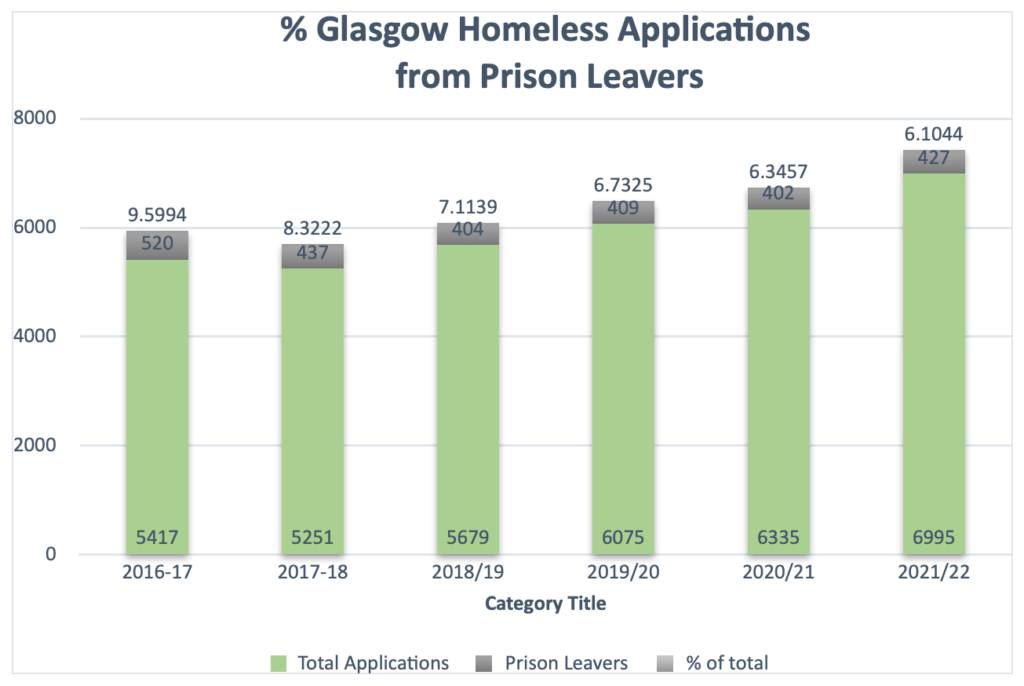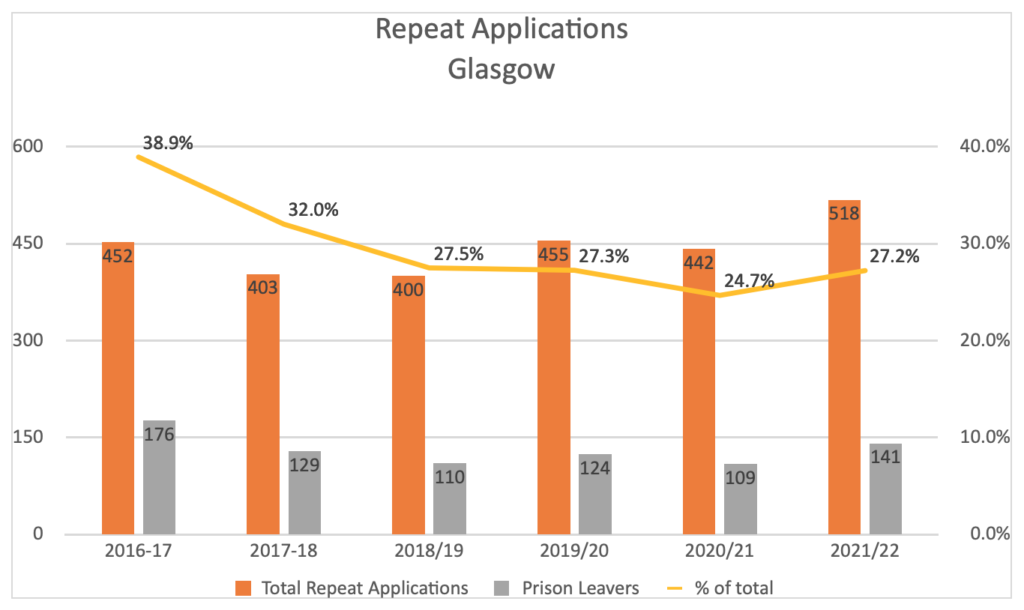Service Manager, Complex Needs Service, Glasgow Health & Social Care Partnership
Glasgow City Health and Social Care Partnership (HSCP) launched its innovative Complex Needs Service on 14 March 2022. This brand-new model brings together specialists to meet the highly personalised needs of people experiencing multiple and complex needs and who have not been able to access mainstream services. This includes Mental Health, Physical Health, Addictions and Social Care resulting in a holistic service tailored to individual need.
The Complex Needs Service will become the interface between Homelessness, Justice Services, Alcohol and Drug Recovery Services, Mental Health and third sector organisations in Glasgow City. All too often people who are homeless are overrepresented in the in the justice system, as Figures 1 and 2 below show – the % of overall Homeless Applications for Glasgow from those leaving prison ranges from 9.6% in 2016/17 to 6.1% in 2021-22- a steady decrease against the backdrop of a rising yearly number of total Homelessness Applications for Glasgow.
For Repeat Application (Figure 2 below) that % is much higher, ranging from 38.9% in 2016/17 to 27.2% in 2021/22 – again against the backdrop of a fluctuating but still over rising number of total Repeat Applications.
1 – % of Homeless Applications from Prison Leavers Glasgow

2 – % Of Repeat Homeless Applications – Glasgow

There has been much work done within the Health & Social Care Partnership as part of the Community Justice Glasgow Partnership (CJG) to reduce homelessness and homeless applications generating from those coming into contact with the justice system and in particular those leaving prison, see for example the article ‘Improving Prison Throughcare – Pathfinder to Housing, Health & Benefits (PHHaB)’ in the CJG Annual Reporter 2020-21.
I have no doubt that this work is having an impact as can be seen by the reducing % of applications from prison. The Repeat Application picture with the higher % rate amongst prison leavers is testament to the complex nature of the needs of this population, who as I said are generally overrepresented amongst the homeless population in Glasgow and have some of the most complex needs.
The Complex Needs Service, I do not doubt, will play its part in reducing these percentages further.
Homeless and Asylum Health Service were required to quickly adapt to the challenges from COVID-19 pandemic, and an assertive outreach model was established within the Homeless and Asylum Health Services. This moved away from the clinic-based approach and took the services to people rather. The team also established a daily health care clinic including a response to complex wound care and a new patient clinic offering same-day access to assessment and treatment. The team delivered over 400 flu vaccinations, over 1000 Covid vaccinations, over 500 Naloxone supplies and more than 300 pay as you go mobile phones to service users. This approach achieved positive and sustainable outcomes for people, increased engagement with services and resulted in a significant decrease in risk.
This experience informed the establishment of the Complex Needs Service and moving forward the service will focus on complexity and risk rather than homelessness status alone. The approach is supported with increased resources, and now has around 55 highly dedicated and committed staff, with the necessary skills to support people with complex needs and sustain positive relationships and engagement.
The new Complex Needs service model will continue to listen to the views and experience from individuals with lived experience, which will help shape supports and future developments.
“The new Complex Needs Service has evolved during a period of unprecedented challenges associated with the Public Health emergency. The team have demonstrated resilience, commitment and the skill set necessary to support those presenting with multiple and complex care needs. This service will remain under review with key partners participation including those with lived experience ensuring a culture of continuous improvement. We look forward to reporting on the impact of this service and would like to thank the team for all their efforts ensuring complex care support remain accessible to those who require it.”
“The last two years have allowed us to evolve different teams into one team, with a new specification that allows staff more freedom to go to people where they are, rather than them having to come to us. We knew we had a very high risk and vulnerable population out there and so we changed our model to a completely outreach approach. We are taking the support needed to the people who need it, asking them what they need from us, and responding to this. By going to people, they have recognised we are not giving up on them, and they are valued.”
YOU CAN FIND OUT MORE ABOUT THIS SERVICE BY CLICKING THE BOX BELOW:







